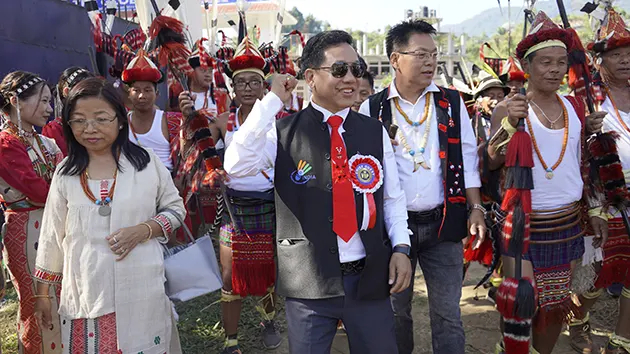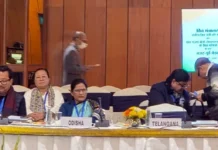KHONSA/ITANAGAR, 25 Nov: The Nocte community celebrated the 57th Chalo Loku festival with traditional fervour and gaiety in Khonsa in Tirap district on Tuesday.
The celebration began with the Rangtam ritual (offering to almighty Rang), followed by thamthut or beating of the traditional log drum.
Attending the festival, Deputy Chief Minister Chowna Mein urged the people to preserve, protect, and promote their culture and traditions, highlighting their potential to attract tourists and boost the local economy.
“Arunachal is a land of festivals, and we must showcase our rich cultural heritage to the outside world to promote cultural tourism,” he said.
Responding to a public memorandum, he accepted the memorandum but due to the imposition of the model code of conduct for the upcoming panchayat elections, he did not announce any project and fund sanction.
He assured to take up the Nocte salt well and Nocte shawl for GI tagging in due course of time.
Mein urged the youths to learn and document the Nocte history, and stressed the need to secure a GI tag for the Nocte shawl and traditional salt well.
The DCM also assured of support for the heritage village project.
Seppa East MLA Ealing Tallang encouraged cultural exchange and urged the younger generation to participate in cultural activities and preserve the state’s rich cultural heritage. He said that sincere efforts must be made to keep the community’s identity intact.
Borduria-Bogapani MLA Wanglin Lowangdong highlighted the significance of Chalo Loku as one of the most important agriculture-related festivals of the Nocte community. He said that the festival is celebrated for recreation and merrymaking after the harvesting of paddy and the season of hard work. He added that it is a time to forget differences, come together, and feast in unity.
Lowangdong also appealed to the state government for GI tagging of the Nocte salt well products.
The festival’s celebration committee president Jiten Wangchha highlighted the significance of Chalo Loku, which also marks the beginning of the Nocte New Year calendar.
On the occasion, books titled Miles Bronson & the Noctes and Odyssey, a souvenir, and the Nocte shawl (initiated by Khunlong Matey and Khowang Hakhun) were released.
Two Nocte audio albums, ‘Jovi Din’ and ‘Oni Na’, were also released.
In Itanagar, acting chairperson of the Arunachal Pradesh State Human Rights Commission, Bamang Tago, attended the Chalo Loku festival celebration.
Greeting the Nocte community on the occasion, Tago recalled that the first Chalo Loku was celebrated on 25 November, 1968 in Khonsa, and that this year marks 57 years of the festival that symbolises gratitude, community bonding, and the agricultural heritage of the Nocte people.
Highlighting the evolving socio-religious landscape of Arunachal Pradesh, Tago emphasised that, while individuals may choose and practice any organised religion, culture remains an inherited identity that transcends religious boundaries.
He reiterated that Arunachal, home to numerous indigenous tribes, practiced nature-centric and animistic belief systems for centuries. These traditional practices, he said, “were never exclusive or rigid, and therefore should not be abandoned merely because someone adopts a modern or organised religion.”
“Religion is a matter of personal faith; culture is our collective memory. One may pray in a church or a temple and still honour ancestral traditions. Festivals like Chalo Loku belong to the community, not to a single faith,” he said. (With DIPRO input)


